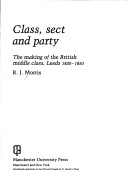The middle class of the northern industrial towns played a key role in economic development and the creation of a class society. This book draws upon a computer-based nominal record linkage to show the complex economic and social structure of that middle class. Party and sectarian loyalties disrupted class formation, whilst the stability of social relations and family strategies was disrupted by the nature of the market economy, and by working-class trade-union and political challenge. The middle classes built their own culture and relations with other social classes through a network of voluntary societies, which expressed and overcame sectarian, party and status divisions. What emerged was a class led by an elite of merchants and professional men, whose culture acknowledged inequality and hierarchy within a class society. The elite accepted responsibility for the stability of the society on which their wealth depended.
By trying to correct misunderstandings about the nature of middle-class culture in this period of rapid economic growth, the author aims to dismiss the notion of middle-class "failure" and asserts the long-term influence of the culture and social formation created in this period.
- ISBN10 0719022258
- ISBN13 9780719022258
- Publish Date 28 June 1990
- Publish Status Out of Print
- Out of Print 25 April 1995
- Publish Country GB
- Imprint Manchester University Press
- Format Hardcover
- Pages 320
- Language English
